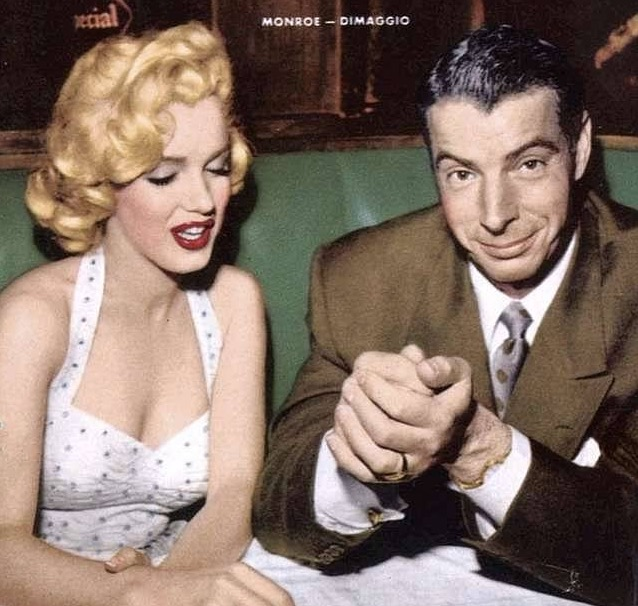Marilyn Monroe and Joe DiMaggio—two names that have echoed through history as icons of Hollywood and sports. Their brief yet passionate marriage, filled with both glamour and turmoil, captivated the world. But what truly sets their story apart is the enduring love DiMaggio held for Monroe, even after her untimely death. For over two decades, he sent roses to her grave, keeping a promise that would define his legacy. But why did he remain so devoted to her, even after their marriage ended in divorce?

When Marilyn Monroe and Joe DiMaggio met on a blind date in 1952, sparks flew almost instantly. DiMaggio, the retired Yankees legend, and Monroe, the rising Hollywood star, were an unlikely pair—yet their chemistry was undeniable. Despite Monroe’s initial hesitations, fearing DiMaggio might be the typical self-absorbed athlete, she found in him a man who treated her with respect and admiration. Their romance quickly blossomed into one of Hollywood’s most talked-about love stories.
In January 1954, Monroe and DiMaggio tied the knot in a wedding that seemed like a Hollywood fairytale come to life. Their marriage was seen as the ultimate symbol of American glamour—the union of baseball’s greatest hero and Hollywood’s brightest star. However, behind the glitz and glamor, their relationship was far from perfect. DiMaggio, a conservative and private man, struggled to cope with Monroe’s skyrocketing fame and the attention it brought.
From the outset, the pressures of their public personas began to strain their marriage. DiMaggio, who cherished a quiet life, found it difficult to adjust to the constant media attention that followed Monroe. On the other hand, Monroe’s desire to continue her acting career clashed with DiMaggio’s traditional views of marriage. He expected her to take on the role of a devoted housewife, a role Monroe was never interested in fulfilling.

One of the most famous moments in Monroe’s career—the subway grate scene from The Seven Year Itch—became a pivotal point in their marriage. As Monroe’s white dress billowed up over the subway grate, revealing more than DiMaggio could handle, his jealousy and possessiveness reached a boiling point. The scene, which thrilled audiences worldwide, left DiMaggio feeling humiliated and angry. The couple had a fierce argument shortly afterward, marking the beginning of the end for their marriage.
In October 1954, just nine months after their wedding, Monroe filed for divorce, citing “mental cruelty.” The public was shocked, but those close to the couple knew the pressures that had been building behind closed doors. Monroe’s desire for independence and DiMaggio’s inability to accept her fame had driven a wedge between them that could not be mended.

Despite their divorce, DiMaggio’s love for Monroe never wavered. He continued to reach out to her, expressing his regret and longing for reconciliation. Even as Monroe moved on with her life, eventually marrying playwright Arthur Miller, DiMaggio remained a constant presence in her life, offering support whenever she needed it.

When news of Marilyn Monroe’s death broke in August 1962, DiMaggio was devastated. The world had lost an icon, but DiMaggio had lost the love of his life. Despite their tumultuous relationship, he had never stopped loving her, and her death left him heartbroken. He took charge of her funeral arrangements, ensuring that the service was private and free from the Hollywood elites he believed had contributed to her downfall.

In a gesture that would become legendary, DiMaggio arranged for roses to be delivered to Monroe’s grave three times a week for over 20 years. This act of devotion, shrouded in mystery and romance, spoke volumes about the depth of his love for her. It was as if, in those roses, DiMaggio was sending a message to Monroe—that his love for her was eternal, untainted by the difficulties they faced during their marriage.

Many have speculated about why DiMaggio remained so devoted to Monroe after her death. Some believe it was out of a deep sense of guilt for not being able to save her from the demons that plagued her life. Others think it was simply the purest form of love—a love that transcended all the pain and heartbreak they had endured.

In his final moments, as DiMaggio lay on his deathbed in 1999, he reportedly whispered, “I’ll finally get to see Marilyn.” These words, spoken at the end of a life filled with achievements and accolades, reveal just how deeply Monroe had touched his soul. Despite the passage of time and the end of their marriage, DiMaggio’s love for Marilyn Monroe never died.

The story of Marilyn Monroe and Joe DiMaggio is more than just a tale of Hollywood glamour and baseball heroism—it’s a testament to the enduring power of love. Despite the challenges and heartbreaks they faced, DiMaggio’s unwavering devotion to Monroe remains one of the most touching love stories of the 20th century. His act of sending roses to her grave, long after she was gone, speaks to a love that was as real and profound as it was complicated.


